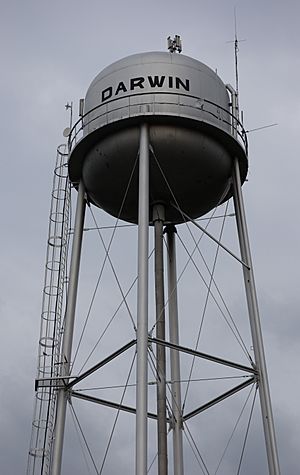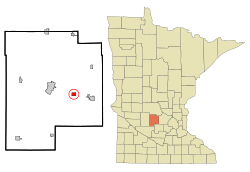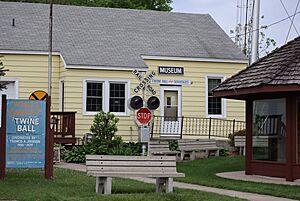Darwin, Minnesota facts for kids
Quick facts for kids
Darwin, Minnesota
|
|
|---|---|

Darwin water tower
|
|

Location in Meeker County and the state of Minnesota
|
|
| Country | United States |
| State | Minnesota |
| County | Meeker |
| Area | |
| • Total | 2.08 sq mi (5.38 km2) |
| • Land | 2.00 sq mi (5.17 km2) |
| • Water | 0.08 sq mi (0.21 km2) |
| Elevation | 1,109 ft (338 m) |
| Population
(2020)
|
|
| • Total | 348 |
| • Density | 174.44/sq mi (67.36/km2) |
| Time zone | UTC-6 (Central (CST)) |
| • Summer (DST) | UTC-5 (CDT) |
| ZIP code |
55324
|
| Area code(s) | 320 |
| FIPS code | 27-14842 |
| GNIS feature ID | 2393721 |
Darwin is a small city in Meeker County, Minnesota, United States. In 2020, about 348 people lived there.
Darwin is famous for something very unique! It is one of the places that says it has the largest ball of twine in the world.
Contents
History of Darwin
Darwin was officially planned and mapped out in 1869. It was named after E. Darwin Litchfield. He was an important person who owned many shares in the Saint Paul and Pacific Railroad company. A post office has been open in Darwin since 1869, helping people send and receive mail.
Geography and Location
Darwin is in the eastern part of Meeker County. U.S. Route 12 goes through the city's northeast side. This road helps people travel to nearby towns.
For example, US 12 goes about 6 miles (10 km) northwest to Litchfield. Litchfield is the main city of Meeker County. The same road also goes about 5 miles (8 km) east-southeast to Dassel.
Land and Water Areas
Darwin covers a total area of about 2.08 square miles (5.38 square kilometers). Most of this area, about 2.00 square miles (5.17 square kilometers), is land. The rest, about 0.08 square miles (0.21 square kilometers), is water.
Part of Turtle Lake is inside the city, on its eastern edge. Lake Darwin is also very close, just outside the city's southeast corner.
Population and People
The number of people living in Darwin has changed over the years. Here is how the population has grown:
| Historical population | |||
|---|---|---|---|
| Census | Pop. | %± | |
| 1880 | 56 | — | |
| 1920 | 132 | — | |
| 1930 | 156 | 18.2% | |
| 1940 | 224 | 43.6% | |
| 1950 | 273 | 21.9% | |
| 1960 | 273 | 0.0% | |
| 1970 | 361 | 32.2% | |
| 1980 | 282 | −21.9% | |
| 1990 | 252 | −10.6% | |
| 2000 | 276 | 9.5% | |
| 2010 | 350 | 26.8% | |
| 2020 | 348 | −0.6% | |
| U.S. Decennial Census | |||
What the 2010 Census Showed
In 2010, there were 350 people living in Darwin. These people lived in 139 homes, and 91 of these were families. The city had about 176 people per square mile (68 people per square kilometer).
Most people in Darwin were White (96.9%). A small number of people were African American (0.3%) or Asian (0.3%). Some people were from other races (1.4%) or from two or more races (1.1%). About 3.4% of the population identified as Hispanic or Latino.
In 2010, about 31% of homes had children under 18. Most homes (57.6%) were married couples. About 25% of homes had just one person living there. The average age of people in Darwin was 38.7 years old.
Fun Things to Do
Darwin is home to the Darwin–Dassel Park, a great place for outdoor activities.
The most famous attraction is the Twine Ball Museum. It's right next to the biggest ball of twine in Minnesota! You can find it on 1st Street and Weird Alley. Weird Alley was named after Weird Al Yankovic. He wrote a funny song called The Biggest Ball of Twine in Minnesota.
Getting Around Darwin
Transportation in the City
U.S. Highway 12 is the main road that goes through Darwin. It helps people travel in and out of the community. Also, a major train line, the BNSF main line, runs through Darwin on its way to Seattle.
See also
 In Spanish: Darwin (Minnesota) para niños
In Spanish: Darwin (Minnesota) para niños
 | Janet Taylor Pickett |
 | Synthia Saint James |
 | Howardena Pindell |
 | Faith Ringgold |


